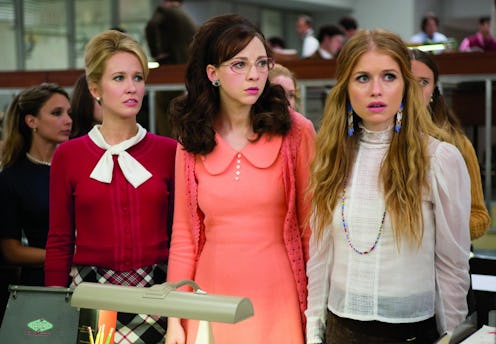Entertainment
'Good Girls Revolt' Is So Relevant To 2016

Inspired by the true story of a group of women who filed a lawsuit against Newsweek, Amazon's series Good Girls Revolt put '60s/'70s gender discrimination front and center. Although it's a period piece, Good Girls Revolt's theme of workplace discrimination is unfortunately still relevant in 2016. On Friday, Variety reported that Amazon declined to pick the series up for a second season. But, even without more seasons to focus on these sexist issues of the past (and some that are still reflected in the present), the episodes Amazon did release will forever serve as an important reminder of where our country has been and how far we still have to go.
The young women in Good Girls Revolt are relegated to the roles of "researchers" and it's made clear to them that being promoted to "writer" or "reporter" is out of the question. After Patti travels across the country to track down sources for the Altamont cover story, she recounts the experience to her love interest, Doug, and breathlessly describes it as "the most exciting thing I've ever done." His condescending response says it all: "You're not a reporter. You're a researcher." By the end of the debut episode, News of the Week loses one of its most talented team members when Nora Ephron declares that she "doesn't belong here" and vows to find a workplace where she can write.
Thankfully, the workplace landscape looks different today. Women are able apply for and hold the same job titles as men, and managers don't publicly make blunt statements about a woman's rightful "place" in the office (hopefully). But, workplace gender discrimination is seemingly here to stay — and I'm not just talking about the wage gap, a complex issue that is decidedly not a myth. Women and men can now hold the same positions, which is all well and good — but things get more complicated when a man has a female boss. According to The Huffington Post, a 2015 study by the Society for Personality and Social Psychology found that men feel threatened by female supervisors, specifically when they report to women who are viewed as "ambitious." Although this doesn't mean that all men resent female bosses, it does prove that there's a significant level of discomfort and even anger amongst many men who report to women.
Then there's the matter of men interrupting women in the workplace — a practice so common that it's been dubbed "manterrupting." Spoiler alert — Donald Trump isn't the only offender. Multiple studies have shown that women are interrupted more often than men and, as a result, men dominate the conversations in workplace meetings, as reported by TIME. Even more depressingly, there's a perception that women speak just as much as their male colleagues — and male executives who speak up more often than their peers are viewed as more competent, while female executives are perceived as less competent. So, although the phrase "female executive" didn't exist during the Good Girls Revolt era, the glass ceiling is a tough one to shatter.
The pilot's depiction of Patti and Doug's relationship also remains relevant. He initially appears bewildered, and later becomes downright angry and condescending, when Patti's ambition and work ethic interfere with their plans as a couple. When Patti describes her whirlwind trip to San Francisco to meet with sources as the most exciting thing she's ever done, he immediately dismisses her hard work. Doug seemingly attempts to put Patti in her place by reminding her of her job title — either because he's threatened by her talent or because he genuinely doesn't understand the concept of an ambitious woman.
Again, it's now normal for both members of a couple to be in the workforce — but a study of 25,000 Harvard Business School graduates found that a significant portion of high-achieving women fall short of their own goals because they prioritize the careers of their partners. Personal and societal pressures are still at play when it comes to deciding which member of a couple should make professional sacrifices for the sake of their families or relationships.
Although Good Girls Revolt is firmly rooted in the tumultuous era of the late 1960s and early 1970s, plenty of the issues raised will likely resonate with women watching the show. Workplace sexism is more subtle than it used to be, but it's still a very real problem that many women cope with every day. Amazon may not be producing more episodes that showcase badass fictional women battling these issues, but the lessons learned in GGR Season 1 are still so important for the women of 2016 to take to heart. And, hopefully like the News of the Week women did, we all come together to keep shattering that glass ceiling in real life.
Images: Amazon Studios (3)